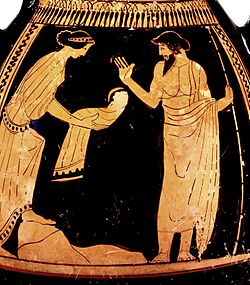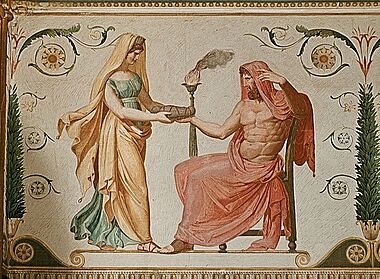Cronus facts for kids
Quick facts for kids Cronus |
|
|---|---|
| God of the harvest | |
| Member of the Titans | |

Rhea offers the stone to Cronus, red-figure ceramic vase c. 460-450 BC, Metropolitan Museum of Art, New York
|
|
| Ancient Greek | Κρόνος |
| Predecessor | Uranus |
| Successor | Zeus |
| Abode |
|
| Planet | Saturn |
| Battles | Titanomachy |
| Animals | Snake |
| Symbol | Grain, sickle, scythe |
| Day | Saturday (hēméra Krónou) |
| Personal information | |
| Consort | Rhea |
| Offspring | Hestia, Hades, Demeter, Poseidon, Hera, Zeus, Chiron |
| Parents | Uranus and Gaia |
| Siblings |
Hecatoncheires
Briareos
Cottus Gyges Arges
Brontes Steropes Other siblings
Gigantes
Erinyes Meliae |
| Equivalents | |
| Roman equivalent | Saturn |
| Egyptian equivalent | Geb |
| Mesopotamian equivalent | Ninurta, Enlil |
In Ancient Greek religion and Greek mythology, Cronus (also spelled Cronos or Kronos) was a powerful leader. He was the youngest of the first generation of Titans. These Titans were divine children of Gaia (Mother Earth) and Uranus (Father Sky). Cronus took over from his father and ruled during a time known as the mythological Golden Age. Later, his own son Zeus defeated him and sent him to Tartarus.
Cronus was often shown holding a sickle or a scythe. These tools were linked to his role as a god of the harvest. In Athens, people held a festival called Kronia to honor Cronus. This festival celebrated the harvest, showing his connection to farming. Cronus was also seen as the same god as the Roman deity Saturn.
Contents
Mythology
How Cronus Rose to Power
In an old myth, Cronus felt jealous of his father, Uranus, who ruled the entire universe. Uranus made Cronus's mother, Gaia, angry. He had hidden Gaia's huge younger children, the hundred-handed Hecatoncheires and the one-eyed Cyclopes, deep in Tartarus. This was so they would not see the light of day.
Gaia then made a special sickle out of stone. She gathered Cronus and his brothers. She asked them to help her defeat Uranus. Only Cronus was brave enough to do it. Gaia gave him the sickle and helped him hide. When Uranus came to meet Gaia, Cronus attacked him with the sickle. From this event, new beings like the Gigantes, Erinyes, and Meliae were born. Even the beautiful goddess Aphrodite came from the sea foam created during this time. Because of this act, Uranus warned his sons, calling them Titans for going too far. After his victory, Cronus threw the sickle into the sea. It was hidden under the island of Corfu, which looks like a sickle.
After taking over, Cronus put the Hecatoncheires and Cyclopes back in Tartarus. He even set a dragon named Campe to guard them. Cronus and his older sister Rhea became the new king and queen of the world. The time when Cronus ruled was called the Golden Age. People lived happily, and there was no need for laws. Everyone did what was right, and bad behavior was not common.
Cronus, King of the Gods
After becoming king, Cronus learned a scary prophecy from Gaia and Uranus. He was told that one of his own children would defeat him, just as he had defeated his father. To stop this from happening, Cronus did something terrible. As soon as his children were born, he swallowed them whole. He swallowed Demeter, Hestia, Hera, Hades, and Poseidon.
When his sixth child, Zeus, was born, Rhea was very upset. She asked Gaia for help to save Zeus and get back at Cronus. Rhea secretly gave birth to Zeus on the island of Crete. She then tricked Cronus by giving him a stone wrapped in baby clothes. This stone is known as the Omphalos Stone. Cronus quickly swallowed it, thinking it was his new son.
Rhea kept Zeus hidden in a cave on Mount Ida, Crete. Some stories say a goat named Amalthea raised him. Armored dancers called Curetes would shout and clap to hide the baby's cries from Cronus. Other stories say a nymph named Adamanthea raised Zeus. She hung him from a tree so he was between the earth, sea, and sky, which Cronus ruled. Still other myths say his grandmother, Gaia, raised him.
Cronus Is Overthrown
When Zeus grew up, he found a way to make Cronus throw up his swallowed children. He used a special potion given to him by Gaia (or Metis in other versions). Cronus first threw up the stone, which was placed at Pytho near Mount Parnassus. Then, he threw up his two brothers and three sisters, who were now grown gods.
After freeing his siblings, Zeus also released the Hecatoncheires and the Cyclopes. In return, the Cyclopes made powerful weapons for them. They forged Zeus's thunderbolts, Poseidon's trident, and Hades' helm of darkness. A huge war began, called the Titanomachy. Zeus and his siblings, with the help of the Hecatoncheires and Cyclopes, fought and defeated Cronus and the other Titans.
After the war, many Titans were sent to Tartarus. However, some Titans like Oceanus, Helios, Atlas, Prometheus, Epimetheus, and Astraeus were not imprisoned. Gaia later created the monster Typhon to get revenge for the imprisoned Titans.

Stories differ about what happened to Cronus after the Titanomachy. In some tales, he stays in Tartarus forever with the other Titans. But in other traditions, Zeus eventually showed mercy and set Cronus and the other imprisoned Titans free. Some ancient texts even say that Cronus was released by Zeus and went to rule over heroes in the Isles of the Blessed. This was a mythical land where Greek heroes lived happily after death.
Other Stories About Cronus
In one story about the monster Typhon, after the Giants were defeated, Gaia complained to Hera. Hera then went to Cronus. Cronus gave Hera two eggs and told her to bury them. He said they would create a creature strong enough to defeat Zeus. Hera did this, and that is how Typhon was born.
Cronus was also said to be the father of the wise centaur Chiron. Chiron's mother was the Oceanid Philyra. One day, Cronus was with Philyra when his wife Rhea appeared unexpectedly. To avoid being caught, Cronus quickly changed into a horse and galloped away. This is why Chiron was half-human and half-horse.
Cronus is also mentioned in a funny story by the writer Lucian. In this story, Cronus talks about his festival, Saturnalia. He says he peacefully gave up his throne to Zeus. But he still rules for seven days each year during his festival. This is to remind people of the easy and rich life they had under his rule before the Olympian gods took over.
Astronomy
The planet Saturn is named after Cronus's Roman equivalent. In modern Greek, the planet Saturn is still called "Cronus" (Κρόνος). In 2017, a star (HD 240430) was named after Cronus because it was thought to have swallowed its own planets.
"Cronus" was also a suggested name for the dwarf planet Pluto. However, this name was not chosen.
Genealogy
| Descendants of Cronus and Rhea | |||||||||||||||||||||||||||||||||||||||||||||||||||||||||||||||||||||||||||||||||||||||||||||||||||||||||||||||||||||||||||||||||||||||||||||||||||||||||||||||||||||||||||||||||||||||||||||||||||||||||||||||||||||||||||||||||||||||||||||||||||||||||||||||||||||||||||||||||||||||||||||||||||||||||||||||||||||||||||||||||||||||||||||||||||||||||||||||||||||||||||||||||||||||||||||||||||||||||||||||||||||||||||||||||||||||||||||||||||||||||||||||||||||||||||||||||||||||||||||||||||||||||||||||||||||||||||||||||||||||||||||||||||||||||||||||||||||||||||||||||||||||||||||||||||||||||||||||||||||||||||||||||||||||||||||||||||||||||||||||||||||||||||||||||||||||||||||||||||||||||||||||||||||||||||||||||||||||||||||||||||||||||||||||||||||||||||||||||||||||||||||||||||||||||||||||||||||||||||||||||||||||||||||||||||||||||||||||||||||||||||||||||||||||||||||||||||||
|---|---|---|---|---|---|---|---|---|---|---|---|---|---|---|---|---|---|---|---|---|---|---|---|---|---|---|---|---|---|---|---|---|---|---|---|---|---|---|---|---|---|---|---|---|---|---|---|---|---|---|---|---|---|---|---|---|---|---|---|---|---|---|---|---|---|---|---|---|---|---|---|---|---|---|---|---|---|---|---|---|---|---|---|---|---|---|---|---|---|---|---|---|---|---|---|---|---|---|---|---|---|---|---|---|---|---|---|---|---|---|---|---|---|---|---|---|---|---|---|---|---|---|---|---|---|---|---|---|---|---|---|---|---|---|---|---|---|---|---|---|---|---|---|---|---|---|---|---|---|---|---|---|---|---|---|---|---|---|---|---|---|---|---|---|---|---|---|---|---|---|---|---|---|---|---|---|---|---|---|---|---|---|---|---|---|---|---|---|---|---|---|---|---|---|---|---|---|---|---|---|---|---|---|---|---|---|---|---|---|---|---|---|---|---|---|---|---|---|---|---|---|---|---|---|---|---|---|---|---|---|---|---|---|---|---|---|---|---|---|---|---|---|---|---|---|---|---|---|---|---|---|---|---|---|---|---|---|---|---|---|---|---|---|---|---|---|---|---|---|---|---|---|---|---|---|---|---|---|---|---|---|---|---|---|---|---|---|---|---|---|---|---|---|---|---|---|---|---|---|---|---|---|---|---|---|---|---|---|---|---|---|---|---|---|---|---|---|---|---|---|---|---|---|---|---|---|---|---|---|---|---|---|---|---|---|---|---|---|---|---|---|---|---|---|---|---|---|---|---|---|---|---|---|---|---|---|---|---|---|---|---|---|---|---|---|---|---|---|---|---|---|---|---|---|---|---|---|---|---|---|---|---|---|---|---|---|---|---|---|---|---|---|---|---|---|---|---|---|---|---|---|---|---|---|---|---|---|---|---|---|---|---|---|---|---|---|---|---|---|---|---|---|---|---|---|---|---|---|---|---|---|---|---|---|---|---|---|---|---|---|---|---|---|---|---|---|---|---|---|---|---|---|---|---|---|---|---|---|---|---|---|---|---|---|---|---|---|---|---|---|---|---|---|---|---|---|---|---|---|---|---|---|---|---|---|---|---|---|---|---|---|---|---|---|---|---|---|---|---|---|---|---|---|---|---|---|---|---|---|---|---|---|---|---|---|---|---|---|---|---|---|---|---|---|---|---|---|---|---|---|---|---|---|---|---|---|---|---|---|---|---|---|---|---|---|---|---|---|---|---|---|---|---|---|---|---|---|---|---|---|---|---|---|---|---|---|---|---|---|---|---|---|---|---|---|---|---|---|---|---|---|---|---|---|---|---|---|---|---|---|---|---|---|---|---|---|---|---|---|---|---|---|---|---|---|---|---|---|---|---|---|---|---|---|---|---|---|---|---|---|---|---|---|---|---|---|---|---|---|---|---|---|---|---|---|---|---|---|---|---|---|---|---|---|---|---|---|---|---|---|---|---|---|---|---|---|---|---|---|---|---|---|---|---|---|---|---|---|---|---|---|---|---|---|---|---|---|---|---|---|---|---|---|---|---|---|---|---|---|---|---|---|---|---|---|---|---|---|---|---|---|---|---|---|---|---|---|---|---|---|---|---|---|---|---|---|---|---|---|---|---|---|---|---|---|---|---|---|---|---|---|---|---|---|---|---|---|---|---|---|---|---|---|---|---|---|---|---|---|---|---|---|---|---|---|---|---|---|---|---|---|---|---|---|---|---|---|---|---|---|---|---|---|---|---|---|---|---|---|---|---|---|---|---|---|---|---|---|---|---|---|---|---|---|---|---|---|---|---|---|---|---|---|---|---|---|---|---|---|---|---|---|---|---|---|---|---|---|---|---|---|---|---|---|---|---|---|---|---|---|---|---|---|---|---|---|---|---|---|---|---|---|---|---|---|---|---|---|---|---|---|---|---|---|---|---|---|---|---|---|---|---|---|---|---|---|---|---|---|
|
|||||||||||||||||||||||||||||||||||||||||||||||||||||||||||||||||||||||||||||||||||||||||||||||||||||||||||||||||||||||||||||||||||||||||||||||||||||||||||||||||||||||||||||||||||||||||||||||||||||||||||||||||||||||||||||||||||||||||||||||||||||||||||||||||||||||||||||||||||||||||||||||||||||||||||||||||||||||||||||||||||||||||||||||||||||||||||||||||||||||||||||||||||||||||||||||||||||||||||||||||||||||||||||||||||||||||||||||||||||||||||||||||||||||||||||||||||||||||||||||||||||||||||||||||||||||||||||||||||||||||||||||||||||||||||||||||||||||||||||||||||||||||||||||||||||||||||||||||||||||||||||||||||||||||||||||||||||||||||||||||||||||||||||||||||||||||||||||||||||||||||||||||||||||||||||||||||||||||||||||||||||||||||||||||||||||||||||||||||||||||||||||||||||||||||||||||||||||||||||||||||||||||||||||||||||||||||||||||||||||||||||||||||||||||||||||||||||
See also
 In Spanish: Crono para niños
In Spanish: Crono para niños
 | Janet Taylor Pickett |
 | Synthia Saint James |
 | Howardena Pindell |
 | Faith Ringgold |

